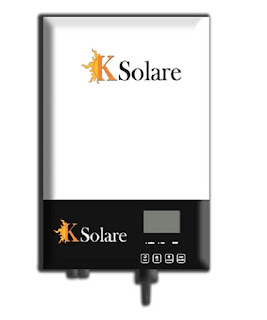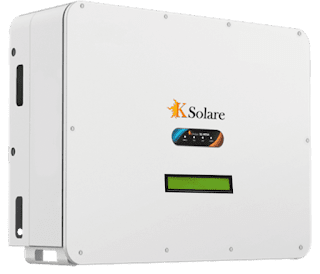On-Grid, Off-Grid & Hybrid: What They Are & How to Choose the Right One
An on-grid inverter converts solar power DC which is constantly varying and feeds it into the mains power supply. It synchronizes its output voltage and frequency to the main power supply it is connected to. As the power of the solar increases, so does the output but it can do this at leisure. To inject electrical power efficiently and safely into the grid, grid-tie inverters must accurately match the voltage, frequency, and phase of the grid sine wave AC waveform.
In an on-lattice framework, this occurs after power arrives
at the switchboard:
- The meter.
Excess solar
energy runs through the meter, which calculates how much power you are
either exporting or importing (purchasing).
- Metering
Systems work contrastingly in many states and nations all over the planet.
In this portrayal, I'm accepting that the meter is just estimating the
power being traded to the lattice, similar to the case in the greater part
of Australia.
- The electricity grid. The power that is shipped off the framework from your planetary group can then be utilized by different purchasers on the matrix (your neighbors). At the point when your planetary group isn't working, or you are utilizing more power than your framework is delivering, you will begin bringing in or consuming power from the matrix.
An off-grid solar
inverter is very popular and it comes with a power backup. Off-grid solar
inverters work independently of the grid. Most home appliances such as Fans,
coolers, TV, AC, Water pumps, etc. can work through this inverter. Off-grid
inverters must supply power from DC to AC instantly to power the appliances. It
must react quickly and up to and over the capacity rating of the inverter. It
draws power from the battery, converts it from DC, and outputs AC.
·
The
battery bank. In an off-grid system, there is no open power matrix. When
sunlight-based power is involved by the apparatuses in your property, any
abundance of power will be shipped off your battery bank. When the battery is
full it will quit getting power from the nearby planet group. At the point when
your planetary group isn't working (evening or shady days), your apparatuses
will draw power from the batteries.
·
Backup
Generator. For seasons when the batteries are coming up short on charge and
the weather conditions are exceptionally shady you will, by and large, need a
reinforcement power source, for example, a reinforcement generator or gen-set.
The size of the gen-set (estimated in kVA) ought to be satisfactory to supply
your home and charge the batteries simultaneously.
A hybrid solar inverter is the
combination of a solar inverter and a battery inverter into a single piece of
equipment that can intelligently manage power from your solar panels, solar
batteries, and the utility grid at the same time. Having all the key features
for solar and battery storage in one simple plug-and-play inverter means hybrid
inverters are generally much lower cost and easier to install compared to more
complex battery storage systems which often require multiple inverters.
- The battery bank. In a hybrid
system, once the solar power is used by the appliances in your property,
any excess power will be sent to the battery bank. Once the battery bank
is fully charged, it will stop receiving power from the solar system. The
energy from the battery can then be discharged and used to power your
home, usually during the peak evening period when the cost of electricity
is typically at its highest.
·
The meter
and power lattice. Contingent upon how your cross-breed framework is set up
and whether your utility permits it when your batteries are completely
energized abundance sun based power not needed by your apparatuses can be
traded to the lattice by means of your meter. At the point when your nearby
planet group isn't being used, and assuming you have depleted the usable power
in your batteries your machines will then, at that point, begin drawing power
from the matrix.
About Us-
KSolare Energy was established in 2012 and is located in Pune. The promoter of the company has wide experience of over 25 years in the field of renewable energy particularly in power electronics had worked in multinational companies in US, Spain, Germany & Portugal. The company products line-up covers Grid Tie & Hybrid Inverters in collaboration with big International companies. As one of the largest Hybrid Solar Inverter manufacturers in India, KSolare has an advanced automatic testing setup with certification. KSolare executed 805+ MW with a total installation of over 175,000+ Inverters in PAN India with efficient aftersales service support with the lowest failure rate and 100% Customer satisfaction because of after-sale service & quality. Contact Us on Sales: 7888009282/83/84/85 Service: 8530111222 / 7030955501 Email: sales@ksolare.com , service@ksolare.com




Comments
Post a Comment